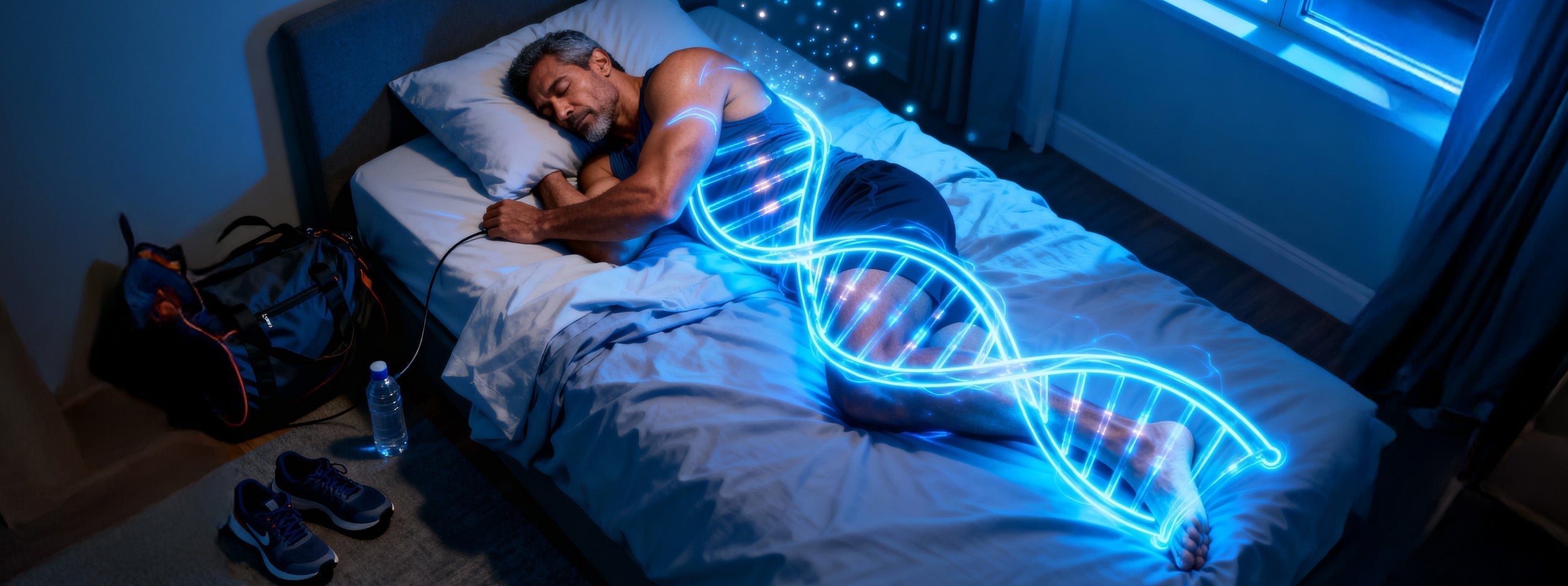WORKOUT HACK: Less work... more gains

You’re in the gym every day. Crushing lifts. Chasing PRs. Pushing through every rep. And yet… progress is stalling. Belly fat isn’t budging. Energy dips. Sex drive? Forget about it. Sound familiar? * Chances are, you’re not undertraining—you’re overtraining. *
Overtraining: The Silent Progress Killer*
Overtraining isn’t just about feeling sore or tired. Chronic overtraining can affect stress hormones, which are connected to testosterone, growth hormone, and IGF-1—hormones involved in muscle, fat, and energy regulation [1]. * When these hormones are impacted, recovery can slow, energy may dip, and body composition changes may become more noticeable [2]. *
So, what does overtraining look like in real life?
-
Persistent fatigue that doesn’t improve with rest
-
Stubborn belly fat
-
Low motivation to train or lift heavy
-
Poor sleep and recovery
-
Decreased performance in the gym
-
Lower sex drive and mood swings * [1][2]
It’s not a lack of effort—it’s a mismatch between stress and recovery. More gym time doesn’t always equal more results. In fact, it can actively block progress. *
Smarter Training: The Key to Gains
Here’s the hack: less can be more. Strategic training that balances intensity and recovery lets your hormones peak naturally, so your body actually responds to effort instead of shutting down. High-intensity, focused sessions with proper rest spur hormone secretion, improve muscle growth, and enhance fat-burning efficiency [1]. *
You don’t need daily marathon sessions or endless rep schemes. You need well-timed workouts, enough sleep, and recovery protocols that let your body respond. That’s how gains happen. *
Spotting the Recovery Sweet Spot
The key is to monitor stress signals and recovery markers:
-
Are lifts getting weaker instead of stronger?
-
Do you need more caffeine just to get through workouts?
-
Is motivation low, even for workouts you normally enjoy?
If yes, it’s time to dial back and let your body catch up. Recovery isn’t optional—it’s the secret ingredient most guys skip. *
And for men over 35, supporting your body’s natural hormone balance can be a game-changer. Products like BioPro+® provide clinically studied ingredients designed to support metabolism, energy, and workout recovery, helping you maximize results from every session—drug-free, no needles, no prescriptions. *
3 Tips to Avoid Overtraining
-
Schedule Rest Days: Your muscles need time to repair. Train hard 3–4 days per week, then rest or do light activity.
-
Track Intensity: Keep a log of lifts and energy. If performance drops for multiple sessions, it’s a sign to back off. *
-
Prioritize Recovery: Sleep, nutrition, and hydration are non-negotiable. Consider targeted support like BioPro+® to help maintain hormonal balance and energy. *
Your Next Move
Overtraining isn’t a badge of honor. It’s a progress killer. Less work—done strategically with proper recovery—gives you more gains. * Hormones recover, muscle grows, fat burns, and energy comes back. *
Stop punishing your body with endless reps. Train smart, rest right, and support your body intelligently. * Your workouts will thank you—and so will your results.
* These statements have not been evaluated by the Food and Drug Administration.
These products are not intended to diagnose, treat, cure, or prevent any disease.
Works Cited
-
Fiala, Ondrej, Michaela Hanzlova, Lenka Borska, Zdenek Fiala, and Drahomira Holmannova. “Beyond physical exhaustion: Understanding overtraining syndrome through the lens of molecular mechanisms and clinical manifestation.” Sports Medicine and Health Science, vol. 7, 2025. doi:10.1016/j.smhs.2025.01.006
-
Kreher, Jeffrey B., and Jennifer B. Schwartz. “Overtraining syndrome: a practical guide.” Sports Health, vol. 4, no. 2, 2012, pp. 128-138. doi:10.1177/1941738111434406




